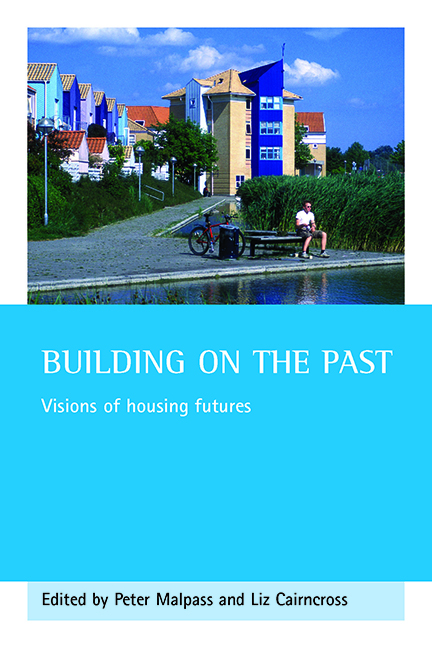Book contents
- Frontmatter
- Dedication
- Contents
- List of tables, figures and photographs
- Foreword
- Acknowledgements
- List of contributors
- one Introduction
- two Moving with the times: changing frameworks for housing research and policy
- three A new vision for UK housing?
- four Housing demand, supply and the geography of inequality
- five Understanding the drivers of housing market change in Britain’s postindustrial cities
- six Affordability comes of age
- seven Mob mentality: the threat to community sustainability from the search for safety
- eight Housing and the ageing population
- nine Tenant futures: the future of tenants in social housing
- ten Democracy and development
- eleven Conclusion
- Index
- Also available from The Policy Press
eight - Housing and the ageing population
Published online by Cambridge University Press: 15 January 2022
- Frontmatter
- Dedication
- Contents
- List of tables, figures and photographs
- Foreword
- Acknowledgements
- List of contributors
- one Introduction
- two Moving with the times: changing frameworks for housing research and policy
- three A new vision for UK housing?
- four Housing demand, supply and the geography of inequality
- five Understanding the drivers of housing market change in Britain’s postindustrial cities
- six Affordability comes of age
- seven Mob mentality: the threat to community sustainability from the search for safety
- eight Housing and the ageing population
- nine Tenant futures: the future of tenants in social housing
- ten Democracy and development
- eleven Conclusion
- Index
- Also available from The Policy Press
Summary
Introduction
Understanding about older people and housing has been influenced by pervasive social constructions of ageing that portray older life as a time of disengagement from the workforce, followed by low economic production or consumption, increasing decline, poverty, dependency and death (Phillipson, 1998; Tulle-Winterton, 1999). Today older age is rarely portrayed so narrowly, but negative images are persistent (Age Concern England and ITC, 2000; Audit Commission, 2004), and ageism, described by Bytheway (1995) as prejudice on the grounds of age, is deeply embedded in society and our institutions. The cumulative effects frequently lead to impoverished and narrow views about the relationship between housing and later life, a state of affairs that Means, for example, has strongly contested (see Means, 1999).
The 2001 Census showed that for the first time there are more people aged 60 and over than there are children in Britain. It is part of a shift in the age balance of the population, and the trend is set to continue, but we are not prepared for the changes that have occurred and will come. This chapter looks ahead to 2020, and considers where current policy, patterns of consumption, changes as a result of having more people who are ‘older’ in the workforce, changes in planning, house production and technology, and the impacts of a shifting age balance will take us. There are some trends we can be relatively certain about, but others are harder to predict, for example, trends indicating that health improvements will continue for most in later life. The chapter also aims to bring the subject of having an ageing society into mainstream housing and planning debates. After all, by 2020, which is not far away, the older population will be swelled by retiring ‘baby boomers’, and by 2025 the number of people in Britain over 60 years old will outnumber people under 25. By 2050 the ratio of people aged 65 years and older compared to 20- to 64-year-olds will rise from around 27% to 48% (DTI, 2000; GAD, 2003a).
The broad picture
The age shift
The 2001 Census reported population figures for England of just over 48 million, and showed that 27.9% are aged 55 and over.
- Type
- Chapter
- Information
- Building on the PastVisions of Housing Futures, pp. 185 - 220Publisher: Bristol University PressPrint publication year: 2006
- 1
- Cited by

